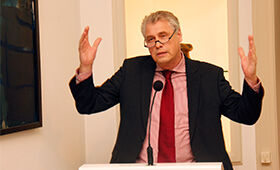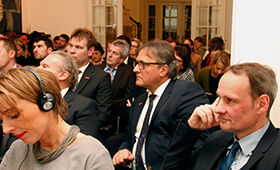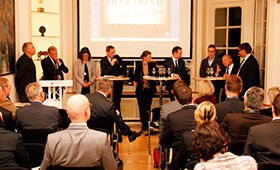Using education and training to master structural change in the craft trades
Digital transformation is already leaving its mark on the craft trades sector. Speaking at an international conference in Brussels, BIBB President Friedrich Hubert Esser emphasised that education and training are necessary in order to cope with structural change.
Digital transformation has been affecting both industry and the craft trades in Germany for some considerable time. At a conference hosted in Brussels as part of the “European Vocational Skills Week”, Professor Friedrich Hubert Esser, President of the Federal Institute for Vocational Education and Training (BIBB), addressed an audience comprising policy decision makers, experts and other stakeholders. He stressed that there was a particular need for education and training if structural change was to be overcome.
Speaking at the Permanent Representation of the State of Rhineland-Palatinate to the European Union, he remarked on the “pacemaker function” exercised by major companies and on the “asymmetry in the level of digital transformation”, whilst also expressing a wish that the craft trades sector should move with the times and “catch up”. The inter-company training of apprentices was providing support in this regard. “Training and competences centres are bringing the impetuses of 4.0 technologies into the individual companies,” said Professor Esser. “This is leading to innovative products and services.”
He presented examples from various areas to demonstrate the extent to which BIBB is helping to shape the changes which are ensuing. He made reference first to regulatory work, that is to say, occupational profiles which are formulated openly rather than being described in terms of specific skills. Even in popular occupations, revising training regulations was only necessary every six to eight years. At the same time, the well-established dual system of vocational education and training ensured that initial and advanced training were updated promptly.
Secondly, Professor Esser explained that BIBB had examined the dual core IT occupations of information technology specialist, information technology and telecommunications system electronics technician, information and telecommunications system support specialist, and information technology officer with a view to carrying out a possible revision. “We identified, for example, that there has been an enormous increase in the significance of data protection and data security,” he said. However, key skills such as learning ability and problem solving competence had also been proven to be relevant for success in training and work alongside specialist knowledge in areas such as the virtualisation of production processes.
To exemplify a third field in which BIBB was fostering the spread of digital technology, Professor Esser presented a joint project with Volkswagen AG which is seeking to identify a “Maintenance technician 4.0”. What is the background to this project? “Skilled workers are becoming ever more distant from the specific product,” explained Professor Esser. “And they are using more and more digital instruments to regulate, manage and monitor the value-added chain.” This was leading to a “conceptual shift” in training. In future, there would be less focus on the idea that trainees should familiarise themselves with an occupation on an area-by-area basis. It would be more important for them to start by gaining an overall picture and then to find their own role within this.
The role played by modern media in this process represents a fourth aspect and is also an object of investigation by BIBB. In this regard, Professor Esser underlined that modern media could possess the capacity to reduce complexity, for example on a large shop floor. “Media can and must make such a production facility tangible. We need strong learning environments!” The particularly important aspect here was efficient teaching and learning that delivers training benefits to the individual. Data glasses, for example, provided an individual and flexible way of identifying things which had previously been unknown. And it was perfectly possible for a quiz to be a didactic method of the future.
How can the implementation of digital elements in the craft trades be accelerated? The BIBB President, who also took part in a podium discussion with representatives from the fields of policy making, trade and industry, and education during his time in Brussels, has a clear view: “Firstly, we need to take the trainers along with us!” Appropriate development of human resources and organisation was one of the areas that needed to be focused on in this regard. “Secondly, we need to acknowledge that, although young people possess an extraordinary degree of affinity with technology, their IT skills are still not extensive enough.” Within this context, precise stipulation needed to be made of what schools were expected to deliver. “This can provide a basis on which vocational education can build and provide benefits for the craft trades sector,” concluded Professor Esser.
The conference presentation was given as a keynote speech on the topic of “Dual training – dual benefit”. Professor Esser was invited to take part by the Minister of Economics of the State of Rhineland-Palatinate, Dr. Volker Wissing, and by the same federal state’s chambers of crafts and trades.


